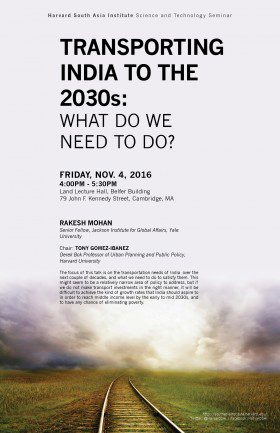Science and Technology Seminar
Rakesh Mohan, Senior Fellow, Jackson Institute for Global Affairs, Yale University
Chair: Tony Gomez-Ibanez, Derek Bok Professor of Urban Planning and Public Policy, Harvard University
The focus of this talk is on the transportation needs of the India over the next couple of decades, and what we need to do to satisfy them. This might seem to be a relatively narrow area of policy to address but, as will become clearer, if we do not make transport investments in the right manner, it will be difficult to achieve the kind of growth rates, around 7-9 per cent per year, that India should aspire to in order to reach middle income level by the early to mid 2030s, and to have any chance of eliminating poverty by then.
People of all ages use transport in their daily lives: for work, for leisure, for school, for fulfilling personal needs and for business requirements. The transport of both passengers and goods is essential for the functioning of any economy. Transport connects producers and consumers. As an economy becomes more complex, the transport needs become correspondingly more demanding. Furthermore, with the emergence of complex supply chains for almost all products—food supplies as well as manufactured goods—the need for sophisticated transport systems has become as important to the farmer as it is for a multinational company. The challenge for India is how we can generate a transport system that is efficient and reliable, but is also affordable and accessible for all. Given our energy dependency, energy efficiency is of the utmost importance in designing the Indian transport system. With transport emissions being key contributors to climate change and urban air pollution, this is another area of concern. As speeds have increased, and poised to increase further, fatalities and injuries have increased exponentially in the transport system, causing extreme levels of human suffering as also high economic costs to the system.

